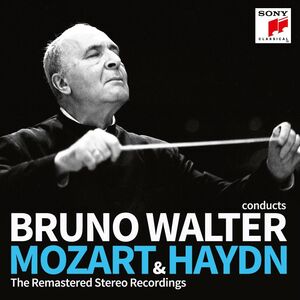Show results for
Deals
- Blu-ray Outlet
- New Release 4K
- New Release Blu-ray
- New Release DVD
- New Release Gifts
- New Release Music
- New Release Vinyl
- Top Seller 4K
- Top Seller Blu ray
- Top Seller DVD
- Top Seller Vinyl
- top sellers all movies
- top sellers all music
- Top Selling Gifts
- TV Outlet
- Top Seller Music
- DVD Outlet
- In Stock Outlet
- Music Outlet

Bruno Walter Conducts Mozart & Haydn Remastered Stereo Recordings
- Format: CD
- Release Date: 03/01/2025

Bruno Walter Conducts Mozart & Haydn Remastered Stereo Recordings
- Artist: Bruno Walter
- Label: Sony Masterworks
- Genre: Classical Artists
- UPC: 198028199728
Product Notes
In the days of the great conductors, many were appreciated, admired, even idolized. Bruno Walter was loved. He was as severe in rehearsal, as demanding of his musicians, as any conductor, but he projected an air of beneficence; it emerged so strongly in his personality that his rather tough-looking visage seemed to glow. All of that also came across - still comes across - in his performances, the more so as he aged. In his glory days with the New York Philharmonic, in the 1940s and 50s, he was considered the antithesis of Arturo Toscanini, but comparison of their recordings often yields more similarities than differences. They highly admired each other; Toscanini privately admitting that Walter may have found something more in Beethoven's Ninth ("perhaps he is right..."). As they aged, Toscanini sped up, adding ever-greater tension to his performances; Walter slowed down, radiating ever-greater love. This was particularly apparent in his Mozart. The German Romantic classics, Beethoven, Brahms, and Mahler, had been central to his middle years, but his life-long devotion to Mozart grew in his "post-retirement" days. Walter had retired in 1958, with final New York Philharmonic performances of Bruckner's Ninth and Mahler's Second (too impoverished to attend both, I chose Bruckner, after much soul-searching). The Mahler and a March 1958 Schubert "Unfinished" were to be his last Philharmonic recordings and his only two stereo ones, but in 1960 he would return to conduct and record Das Lied von der Erde. When he retired to California, Columbia Records executives tried to convince him that stereo would obsolete his monaural recordings and blunt his place in musical history. They offered him a pick-up orchestra, to be called the Columbia Symphony. The size of the orchestra varied with the repertoire, and it's personnel varied greatly from day to day. The "Prague" Symphony, recorded in a single four-hour session, was typical for these 18th-century works: There were 34 players, the strings, 14 violins, 4 violas, 3 cellos, 2 double basses. The concertmaster was Israel Baker, but all the others section leaders were first-desk players of the Los Angeles Philharmonic. The rest were drawn from the inexhaustible supply of retired musicians in Hollywood, many of whom were playing for movie studios. From 1958 to 1961, Walter recorded 55 works in Hollywood's American Legion Auditorium, where the reverberant acoustic supported and enhanced his glowing performances. Only the chorale finale of Beethoven's Ninth proved unsatisfactory, so Walter made one more trip to New York, this time with an East Coast version of the Columbia Symphony and the Westminster Symphonic Choir. Walter's Mozart and Haydn are anything but historically informed practice. Yet they are so winning that only the direst curmudgeon might complain. Haydn requires a quick, dynamic wit that didn't align with Walter's musical personality. His two New York Philharmonic Haydn symphonies (Nos. 95 and 102) are closer to ideal than these two (Nos. 88 and 100) from Hollywood. Still, they all make wonderful listening, for Walter's Haydn if not for Haydn's. His New York Mozart symphonies, recorded late in the 1950s, are close to these Hollywood efforts, the New York orchestra a touch more well-integrated. -James H. North


